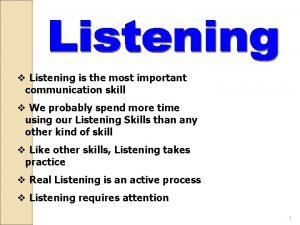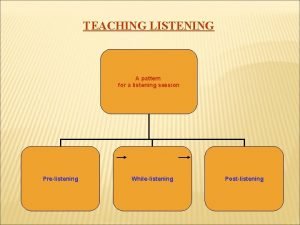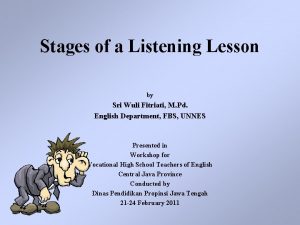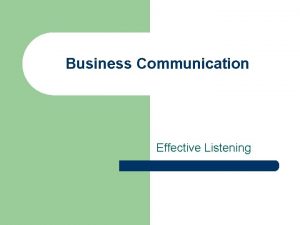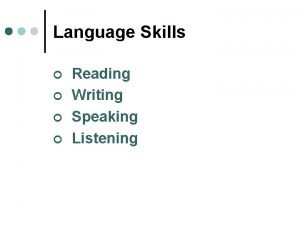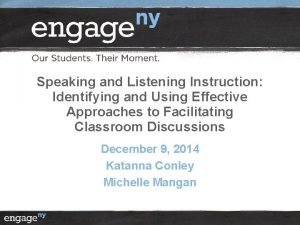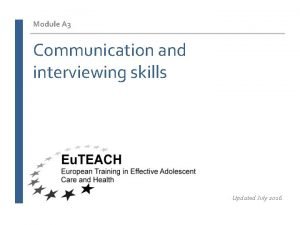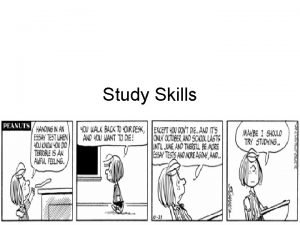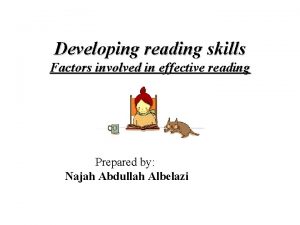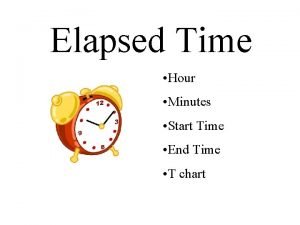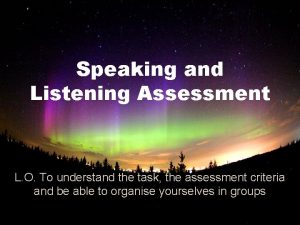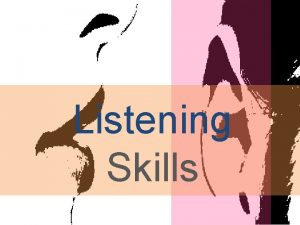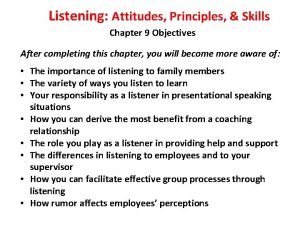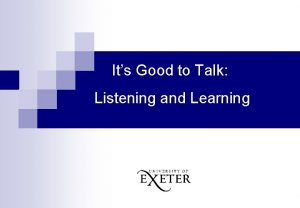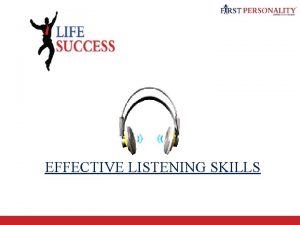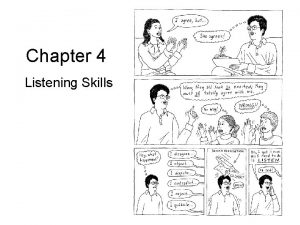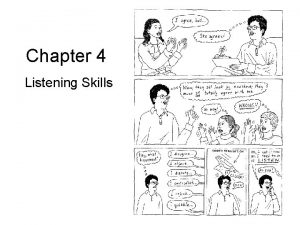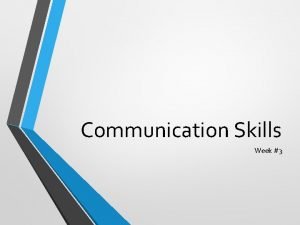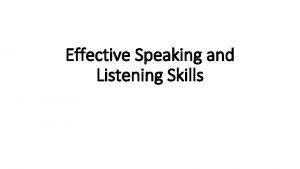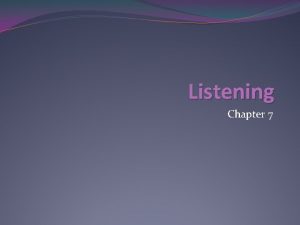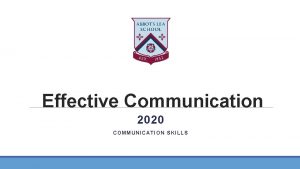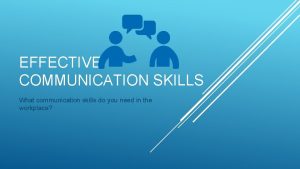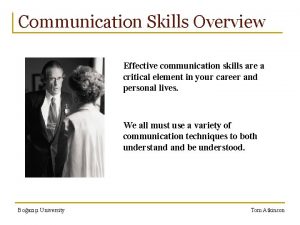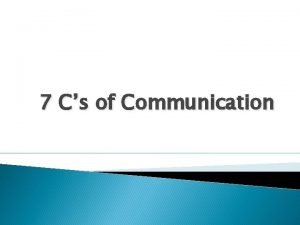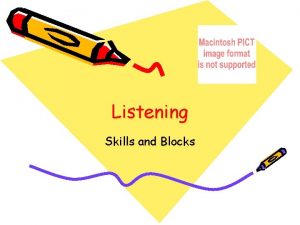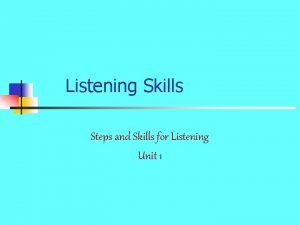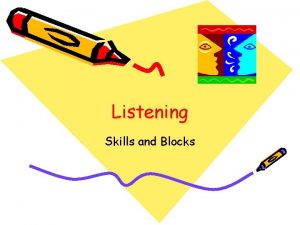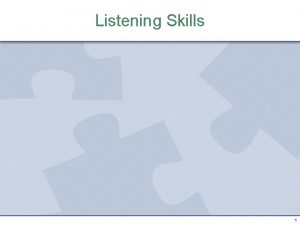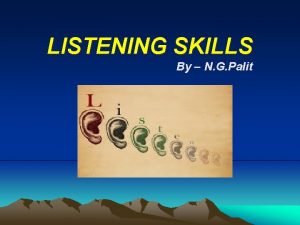EFFECTIVE LISTENING TIME DEVOTED TO COMMUNICATION SKILLS LISTENING


























- Slides: 26

EFFECTIVE LISTENING

TIME DEVOTED TO COMMUNICATION SKILLS LISTENING 53% WRITING 14% READING 17% SPEAKING 16%

WE USUALLY….

What did you say?

Myths about listening • • • Listening is connected to intelligence Listening cannot be learned Listening is the same as hearing Listening is automatic Listening means agreeing

Listening • Listening is an ongoing process • Most of us think we are better listeners than we really are • Cost of poor listening is high • Listening is hearing and interpretation (perception + response)

Listening - different ways • Appreciatively • Plays, Music, Entertainment • Empathically • Offer support and sympathy • Evaluatively • Debate, Argumentation • Critically • Understanding, Comprehension

How Do You Rate Yourself As a Listener?

I allow the speaker to express their complete thoughts without interrupting. I avoid becoming hostile or excited if a speaker’s views differ from mine. I repeat the essential details of a conversation back to the speaker. I tune out distractions when listening. I make an effort to show interest in the other person’s conversation. I remember that people are less defensive when they feel they’re being understood. I understand I don’t have to agree with the speaker. In personal conversation, I look for nonverbal forms of communication, such as body language, tone of voice and other signals that provide information in addition to the speaker’s words.

Problem Causing Listening Responses

Problem-Causing Listening Responses Listener type Listening Behavior Mis-interpreting thoughts The static listener Gives no feedback, remains Why isn’t she reacting? relatively motionless, reveals no expression The monotonous feedback giver Seems responsive, but the responses never vary, regardless of what you say Am I making sense? Why is he still smiling? I am being serious The overly expressive listener Reacts to just about everything with extreme responses Why is so expressive: I didn’t say anything provocative. She’ll have a heart attack when I get to the punch line. The reader/writer Reads or writes about matters having nothing to do with what the speaker is saying Am I that boring?

Problem-Causing Listening Responses Listener type Listening Behavior Mis-interpreting thoughts The eye avoider Looks all around the room and at others, but never you Why isn’t he looking at me? The preoccupied listener Listens to other things at the This person is rude. same time, often with headphones, cell phone etc The waiting listener Listens for a cue to take over Is he listening to me or the speaking turn rehearsing his next response? The thought-completing listener Listens a little and then finishes your thought Am I that predictable? Why do I bother saying anything? The angry listener Reacts with anger and rude comments This person is a &*%%#$

Women Men • Women seek to build rapport and establish a closer relationship and use listening skills to achieve these ends. • The woman seeks to be liked, so she expresses agreement. • Women give more specific listening cues than men. • Men will play up their expertise, and use it in dominating the interaction • The goal of a man in conversation is to be given respect, so he seeks to show his knowledge Gender and Listening

Some cultures-Western Europe and the United States favor direct speech… “say what you mean and mean what you say. ” Many Asian cultures favor indirect speech. They emphasize politeness and maintaining a positive public image rather than absolute truth. Culture and Listening

• Nonverbal signals will vary. Eye contact, haptics touching proxemics distance and territory • Gestures • Kinesics-body language • Vocalics- louder/softer, accent, idioms ( simple as pie) Culture

• S. • L. • O. • W. • E. • R SQUARE UP LEAN OPEN STANCE WAIT EYE CONTACT REFLECTIVE LISTENING S. L. O. W. E. R.

• Some stories we can relate to • Focus on the person, not the story • Identify feelings • Use encouragers Stealing the Conversation

Skills for Active Listening…

Skills for Active Listening OPEN-ENDED QUESTIONS Examples: What happened after that? Who was there? What did they do? How did that work? American Student Achievement Institute

Skills for Active Listening REPEAT CONTENT Examples: So what I hear you saying is. . . American Student Achievement Institute

Skills for Active Listening ACKNOWLEDGING FEELINGS Examples: You’re feeling ___. It makes you (feeling) that. . . American Student Achievement Institute

Skills for Active Listening DON’T JUDGE Examples: Bite your tongue! American Student Achievement Institute

Skills for Active Listening BEING QUIET Examples: Just listen American Student Achievement Institute

• • • Uses eye contact appropriately. Cares enough to want to improve. Is attentive and alert to a speaker’s verbal and nonverbal behavior. Is patient and doesn’t interrupt. Is responsive, using verbal and nonverbal expressions. Asks questions in a non-threatening tone. Paraphrases, restates, or summarizes the speaker. Provides constructive feedback. Is empathic (works to understand the speaker). Demonstrates a caring attitude and is willing to listen Doesn’t criticize, is nonjudgmental. Is open-minded. A GOOD LISTENER

PEOPLE WANT TO FEEL HEARD AND UNDERSTOOD BY YOU…WHEN THAT HAPPENS YOU HAVE EFFECTIVE COMMUNICATION

How to listen critically • Be quiet • Be focused • Listen for concepts and ideas • What are the main points • What is NOT said • Organize what you hear • Make connections • Listen for patterns, transitions • Evaluate evidence carefully
 Importance of listening skills
Importance of listening skills Pre listening while-listening and post listening
Pre listening while-listening and post listening Pre listening stage
Pre listening stage Listening in business communication
Listening in business communication Art of communication quotes
Art of communication quotes Listening writing speaking reading
Listening writing speaking reading A devoted son summary
A devoted son summary A devoted son comprehension marking scheme
A devoted son comprehension marking scheme Hereditary influence of rizal
Hereditary influence of rizal They devoted themselves to the apostles teaching
They devoted themselves to the apostles teaching Listening skills examples
Listening skills examples Speaking and listening: effective group discussions
Speaking and listening: effective group discussions Family
Family Developing effective study skills
Developing effective study skills How might a friend help you resist negative peer pressure
How might a friend help you resist negative peer pressure Effective presentation skills
Effective presentation skills What is reading
What is reading Elapsed time
Elapsed time Active listening passive listening
Active listening passive listening What does critical listening mean
What does critical listening mean What is testing listening
What is testing listening Listening assessment criteria
Listening assessment criteria Listening skills objectives
Listening skills objectives Listening attitudes principles and skills
Listening attitudes principles and skills Aims and objectives of listening skills
Aims and objectives of listening skills Presentation on listening skills
Presentation on listening skills Listening and notetaking skills
Listening and notetaking skills
